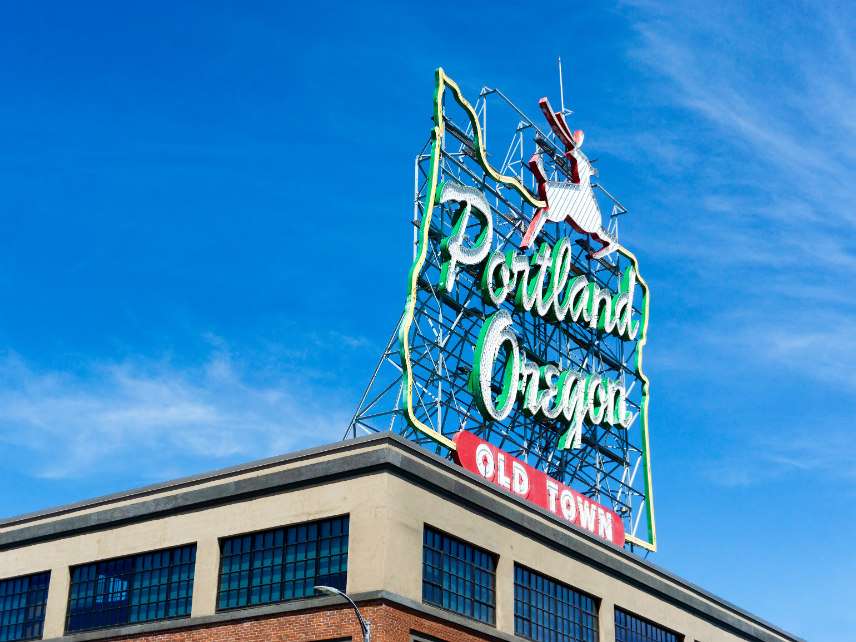Portland's Clean Energy Tax Is Direct Democracy at Its Worst
Environmentalist groups are supporting a ballot initiative that raises taxes on retailers and consumers in order to pay for grants to environmentalist groups.

Voters in Portland, Oregon, will soon decide whether they want to raise the cost of retail purchases to pay for ill-defined clean energy grants and job training programs.
On Monday OregonLive reported that proponents of the Clean Energy Community Benefits Initiative (otherwise known as PDX 04) had gathered enough signatures to be put on the city's November ballot. If passed, the measure—backed by a coalition of minority rights and environmentalist groups including the local chapters of the NAACP, Sierra Club, Asian Pacific American Network, and Audubon Society—would impose a 1 percent tax on gross sales revenue of larger retailers.
This tax is estimated by proponents to pull in $30 million a year, which would then be spent on grants to minority rights and environmental groups to pay for clean energy programs, energy efficiency projects, urban farming initiatives, and job training for low-income and minority Portlanders and the "chronically unemployed."
A new committee, comprised in part of minority rights and environmental activists, would make recommendations on how these grants would be allocated. The mayor and city council would be encouraged, but not strictly required to accept the committee's recommendations.
Despite what might seem like some pretty parochial self-interest at play, backers of PDX 04 insist that taxing large retailers to fund groups very much like their own is necessary if Portland is to meet its ambitious environmental goals of using 100 percent renewable energy by 2035.
"To meet the city's Climate Action Plan," reads the initiative's text, "there is an urgent need to fund and accelerate greenhouse gas reductions and energy efficiencies." That such funding should come from the city's large retailers is only fair, it continues, given how these businesses both "encourage the consumption of heavily packaged and non-recyclable products" and have "have an inherent responsibility and financial capacity" to support the city's climate goals.
Despite the fingering of retailers as responsible for climate change, the PDX 04 initiative gives them remarkably little incentive to clean their act up. Its chosen method of soaking retailers—a gross receipts tax—leaves companies with the same tax burden regardless of whether they're selling plastic-wrapped coal or solar panels.
Nor do the targets of the proposal match up with its own stated environmental goals. Carbon-spewing utility companies would be exempt from the tax. Carbon-lite internet service providers and banks would not.
Indeed, the bluntness of gross receipts taxes is one of the reasons why such taxes have fallen out of favor with policymakers. Given that there is little businesses can do to avoid the tax, they will have to absorb it either by raising prices, or by passing the costs back in the form of reduced wages, hours, and benefits to employees, or via lower prices paid to vendors and suppliers.
Business groups are stressing this point in their opposition to the PDX 04 initiative.
"This new tax on sales is just going to be passed on to families in the form of higher prices on everyday essential items. We all agree that more must be done to address climate change, but making it harder to live here isn't the right answer," said a spokesperson for Keep Portland Affordable, a business-backed group set up to fight the tax initiative.
Portland Mayor Ted Wheeler has also come out against the tax proposal.
Whether these arguments will prove persuasive in November remains to be seen. Taxing big corporations to pay for a grab bag of environmental goodies is pretty dynamite politicking in a famously progressive city like Portland. PDX 04 also makes a number of politically expedient carve outs for medical service providers and most grocery store items that'll make it an easier sell to voters worried about the regressive impacts on lower income residents.
One might hope that the transparent cash grab at play in PDX 04—whereby money from retailers and consumers is siphoned off to pay for the pet projects of the initiative's backers—would be enough to turn off most voters.
Rent Free is a weekly newsletter from Christian Britschgi on urbanism and the fight for less regulation, more housing, more property rights, and more freedom in America's cities.


Show Comments (37)